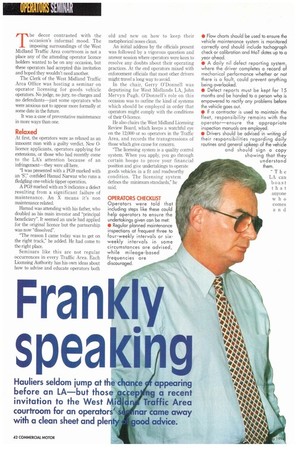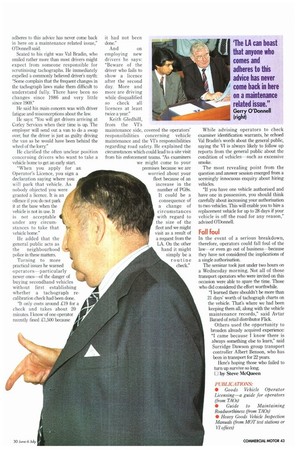Fran I speaki
Page 44

Page 45

If you've noticed an error in this article please click here to report it so we can fix it.
Hauliers seldom jump at the chance appearing before an LA—but those acfep ng a recent invitation to the West Mi. d Traffic Area courtroom for an operators' s nar came away with a clean sheet and plenty •ood advice.
The decor contrasted with the occasion's informal mood. The imposing surroundings of the West Midland Traffic Area courtroom is not a place any of the attending operator licence holders wanted to be on any occasion, but these operators had accepted this invitation and hoped they wouldn't need another.
The Clerk of the West Midland Traffic Area Office was hosting a seminar on operator licensing for goods vehicle operators. No judge, no jury, no charges and no defendants—just some operators who were anxious not to appear more formally at some date in the future.
It was a case of preventative maintenance in more ways than one.
Relaxed
At first, the operators were as relaxed as an innocent man with a guilty verdict. New 0licence applicants, operators applying for extensions, or those who had recently come to the LA's attention because of an infringement—they were all here.
"I was presented with a PG9 marked with an `S'," confided Hamad Narwaz who runs a fledgling one-vehicle tipper operation.
A PG9 marked with an S indicates a defect resulting from a significant failure of maintenance. An X means it's non maintenance related.
Hamad was attending with his father, who doubled as his main investor and "principal beneficiary". It seemed an uncle had applied for the original licence but the partnership was now "dissolved".
"The reason I came today was to get on the right track," he added. He had come to the right place.
Seminars like this are not regular occurrences in every Traffic Area. Each Licensing Authority has his own ideas about how to advise and educate operators both old and new on how to keep their metaphorical noses clean.
An initial address by the officials present was followed by a vigorous question and answer session where operators were keen to resolve any doubts about their operating practices. At the end operators mixed with enforcement officials that most other drivers might travel a long way to avoid.
In the chair, Gerry O'Donnell was deputising for West Midlands LA, John Mervyn Pugh. O'Donnell's role on this occasion was to outline the kind of systems which should be employed in order that operators might comply with the conditions of their 0-licence.
He also chairs the West Midland Licensing Review Board, which keeps a watchful eye on the 12,000 or so operators in the Traffic Area, and records the transgressions of those which give cause for concern.
"The licensing system is a quality control system. When you apply, you go through certain hoops to prove your financial position and give undertakings to operate goods vehicles in a fit and roadworthy condition. The licensing system defines the minimum standards," he said.
OPERATORS CHECKUST Operators were told that including steps like these could help operators to ensure the undertakings given can be met: • Regular planned maintenance inspections at frequent three to four-weekly intervals or sixweekly intervals in some circumstances are advised, while mileage-based frequencies are discouraged. • Flow charts should be used to ensure the vehicle maintenance system is monitored correctly and should include tachograph check or calibration and MoT dates up to a year ahead. • A daily nil defect reporting system, where the driver completes a record of mechanical performance whether or not there is a fault, could prevent anything being overlooked. • Defect reports must be kept for 15 months and be handed to a person who is empowered to rectify any problems before the vehicle goes out. • If a contractor is used to maintain the fleet, responsibility remains with the operator—ensure the appropriate inspection manuals are employed. • Drivers should be advised in writing of their responsibilities regarding daily routines and general upkeep of the vehicle and should sign a copy showing that they understand them. "The LA can boast that anyone who comes and adheres to this advice has never come back in here on a maintenance related issue," O'Donnell said.
Seated to his right was Val Bradin, who smiled rather more than most drivers might expect from someone responsible for scrutinising tachographs. He immediately expelled a commonly believed driver's myth: Some complain that the frequent changes in the tachograph laws make them difficult to understand fully. There have been no changes since 1986 and very little since 1969."
He said his main concern was with driver fatigue and misconceptions about the law.
He says: "You will get drivers arriving at Corley Services when their time is up. The employer will send out a van to do a swap over, but the driver is just as guilty driving the van as he would have been behind the wheel of the lorry."
He clarified the often unclear position concerning drivers who want to take a vehicle home to get an early start.
"When you apply for an Operator's Licence, you sign a declaration saying where you will park that vehicle. As nobody objected you were granted a licence. It is an offence if you do not park it at the base when the vehicle is not in use. It is not acceptable under any circumstances to take that vehicle home."
Ile added that the general public acts as the neighbourhood police in these matters.
Turning to more practical issues he warned operators—particularly newer ones—of the danger of buying secondhand vehicles without first establishing whether a tachograph recalibration check had been done.
"It only costs around 119 for a check and takes about 20 minutes. I know of one operator recently fined £1,500 because
it had not been done."
And on employing new drivers he says: "Beware of the driver who fails to show a licence after the second day. More and more are driving while disqualified so check all licences at least twice a year."
Keith Gledhill, from the VI's maintenance side, covered the operators' responsibilities concerning vehicle maintenance and the VI's responsibilities regarding road safety. He explained the circumstances which could lead to a site visit from his enforcement teams. "As examiners we might come to your premises because we are worried about your fleet because of an increase in the number of PG9s. It could be a consequence of a change of circumstances with regard to the size of the fleet and we might visit as a result of a request from the LA. On the other hand it might simply be a routine check."
While advising operators to check examiner identification warrants, he echoed Val Bradin's words about the general public, saying the VI is always likely to follow up reports from the general public about the condition of vehicles--such as excessive smoke.
The most revealing point from the question and answer session emerged from a seemingly innocuous enquiry about hiring vehicles.
"If you have one vehicle authorised and have one in possession, you should think carefully about increasing your authorisation to two vehicles. This will enable you to hire a replacement vehicle for up to 28 days if your vehicle is off the road for any reason," advised O'Donnell
Fall foul
In the event of a serious breakdown, therefore, operators could fall foul of the law—or even go out of business—because they have not considered the implications of a single authorisation.
The seminar took just under two hours on a Wednesday morning. Not all of those transport operators who were invited on this occasion were able to spare the time. Those who did considered the effort worthwhile.
"I learned there shouldn't be more than
21 days' worth of tachograph charts on the vehicle. That's where we had been keeping them all, along with the vehicle
maintenance records," said Avtar Barard of retail distributor Flick. Others used the opportunity to broaden already acquired experience: "I came because I know there is always something else to learn," said Surridge Dawson group transport controller Albert Benson, who has been in transport for 22 years.
Here's hoping those who failed to turn up survive so long.
Li by Steve McQueen PUBLICATIONS: • Goods Vehicle Operator Licensing—a guide for operators (from TA0s) • Guide to Maintaining Roadworthiness (from TA0s) • Heavy Goods Vehicle Inspection Manuals (from MOT test stations or VI offices)
























































































